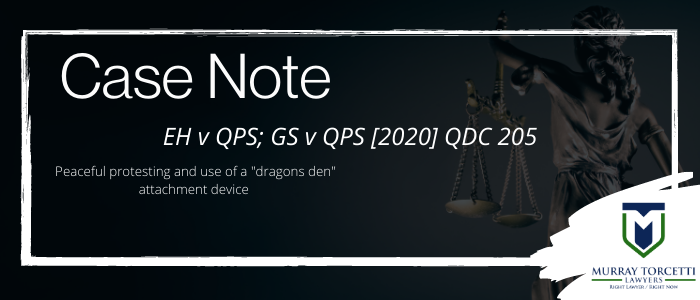Casenote – Protesters Succeed on Appeal against Manifestly Excessive Sentence for using a ‘Dangerous Attachment Device’ to Interfere with Transport Infrastructure
Murray Torcetti Lawyers are criminal lawyers in Caboolture. We write our own case notes from recent criminal decisions for internal purposes.
However, unlike your annoying sibling, we don’t mind sharing.
EH v QPS; GS v QPS [2020] QDC 205
Facts: Two defendants in their early 20s were charged with obstructing, trespassing on, and using a dangerous attachment device to interfere with a railway structure in early January of this year. The defendants were protesting climate action in response to the national bushfires of 2020. As a result of police attending the scene, the two were also subsequently charged with contravening a police direction or requirement.
The defendants attached a ‘dragon’s den’ device to the railway infrastructure, a device captured by the s 14B definition of the Summary Offences Act (‘SOA’).
The defendants plead guilty on the first occasion, and the Acting Magistrate sentenced them both to 3 months imprisonment on a suspended sentence.
The appeal was the first of its kind against the head sentence, a new law introduced in 2019 for connecting a dangerous attachment device to transport infrastructure, contained in section 14C(1) SOA.
The appeal claimed that the sentence imposed was manifestly excessive.
Finding: The Judge, Fantin DCJ, allowed the appeal and re-sentenced the defendants to a single fine of $1,000 each with no conviction recorded.
Her Honour highlighted that the device only caused a potential risk of harm to the protesters themselves instead of emergency services or the wider public; and combining this with a lack of excessive loss/damage/inconvenience suffered by others meant the offending was on the lower end of the scale. These considerations assisted Fantin DCJ’s assessment of the objective seriousness of the offending, the culpability of the defendants and were remarked to be within the Acting Magistrate’s sentencing discretion. The Judge contended that whilst the democratic right to protest is not unfettered, the overall motive as being political and without malice or benefit to the defendants also should have been considered.
The Judge concluded that the Acting Magistrate miscarried the sentencing discretion and made several errors in the decision. As such, and with reference to the antecedents of the defendants, the sentence initially imposed was held to be manifestly excessive.
In support of this decision, Her Honour referred to the Explanatory Notes, illustrated examples of clemency shown in previous cases of civil disobedience, drew analogies between Nolin v Commissioner of Police [2019] QDC 171 and distinguished against facts in Avery & Ors v Queensland Police Service [2019] QDC 2.
Notes for practice:
- Relevance of motive on sentencing as a mitigating, aggravating or neutral factor.
Because lawyers love a good disclaimer – here is ours – It boils down to: If you need legal advice see a lawyer. Dr Google isn’t going to prescribe you meds if you are sick, Google LLB isn’t going to give you advice or information specific to your situation.
If you need legal assistance. See a lawyer.
You might not read it, but we will rely on it if you try and sue us (smug face).
